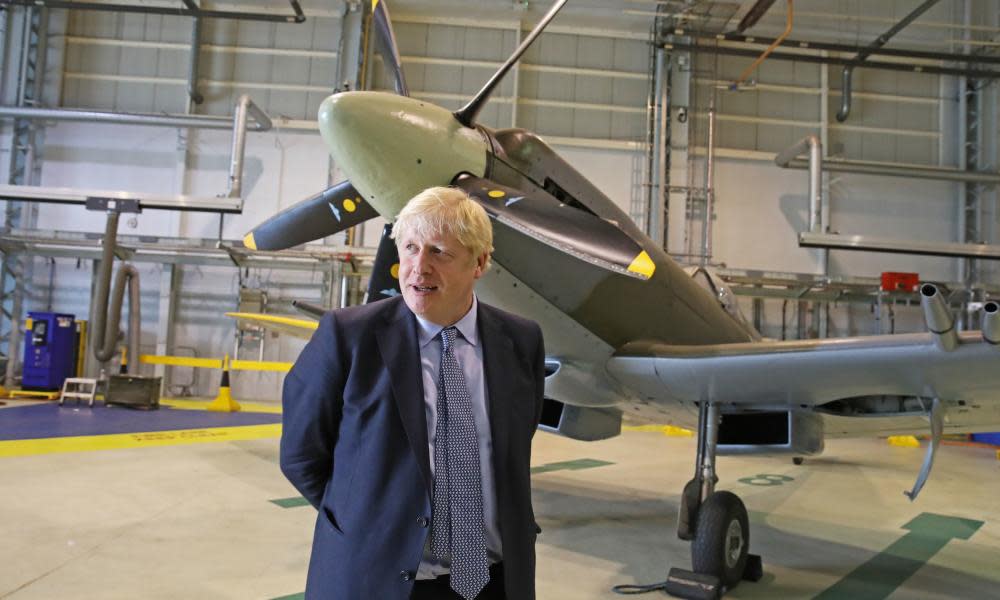The Guardian view on Boris Johnson's first year: purging not governing

When Boris Johnson became prime minister a year ago, he made his overriding priority clear straight away. On the morning of 24 July 2019, before he headed to Buckingham Palace, he made his first appointment – naming the Vote Leave strategist Dominic Cummings as his chief adviser. The choice said that this was to be, above all, the leave government. The appointment of Mr Cummings was the key decision from which every other decision over the past 12 months has followed. Together, they purged Theresa May’s cabinet, purged the parliamentary Conservative party, tried to prorogue parliament, then called an early election, which Mr Johnson won spectacularly over a divided opposition.
At the end of January, the Johnson-Cummings government took Britain out of the European Union, turning their backs on cooperation with Europe over withdrawal or anything else. As they prepared for a planned post-austerity budget in the spring, they purged the cabinet again, forcing out the chancellor, Sajid Javid, who refused to submit to No 10’s centralising rules. Then came the Covid-19 pandemic. The government dithered, then finally imposed a lockdown, which Mr Cummings flouted without apology, and during which Mr Johnson was seriously ill with the virus. As the pandemic eased, the government began yet another purge, this time of senior civil servants, and began preparations for others against Public Health England and the senior judiciary.
At the end of its first year, it may be tempting to see the Johnson government as one that set out on one course, Brexit, but which has found itself blown on to a quite different one because of Covid-19. This would be a mistake. This is not how the Johnson-Cummings government sees itself. In its own eyes, its project is largely unchanged. Covid-19 has radically altered the spending and borrowing environment in which it must work, but it has not changed the government’s destination. This is focused on breaking with Europe, on some modest rebuilding of the post-industrial regional economy and on creating a centralised regime governing through post-liberal Potemkin institutions.
The government’s priority remains the effort to marginalise the half of the electorate that opposed it in 2016 and afterwards. It seeks not just to eradicate pro-Europeanism, but to destroy the influence of that oppositional half of the country. Mr Johnson and Mr Cummings wish to govern through a puppet cabinet, astride a puppet Tory party, in a puppet parliament, commanding a puppet civil service, a puppet media, puppet judges and puppet appointees to public boards. Although speaking in the name of the people, this is in fact the most top-down and centralist government in modern times.
This is why Mr Johnson’s trip to Scotland on Thursday was important. Mr Johnson did not create the movement for Scotland to leave the United Kingdom. He inherited it from his immediate UK government predecessors. But he has made the chances of breakup much greater. The reasons include his own personality, his general lack of interest in anything to do with Scotland and his slovenly handling of the pandemic on which he has been outmanoeuvred by Nicola Sturgeon.
The chief reason, however, is that most Scots disagree with him on some key issues, including Brexit and Covid-19, and he consistently ignores their views. This is how he governs. Much of the time, he is able to get away with it in England or internationally. But the culture of devolution makes it harder. This is especially so in Scotland, and potentially in Wales too, because nationalism offers voters there the alternative of walking away altogether, exactly as the leavers did in Europe. Mr Johnson has been characteristically negligent about Scotland. A year ago, he gave himself the title of minister for the union. But he has taken no initiative to suggest it actually means anything to him. This week he flew north because the UK’s hold on Scotland is weakening. Polls show significant shifts in favour of independence.
His visit will only make a difference if it is part of a serious governing strategy in which Mr Johnson and Mr Cummings are prepared to compromise and engage. All the evidence from their first year, though, is that this is the last thing they are interested in doing.

 Yahoo News
Yahoo News 
